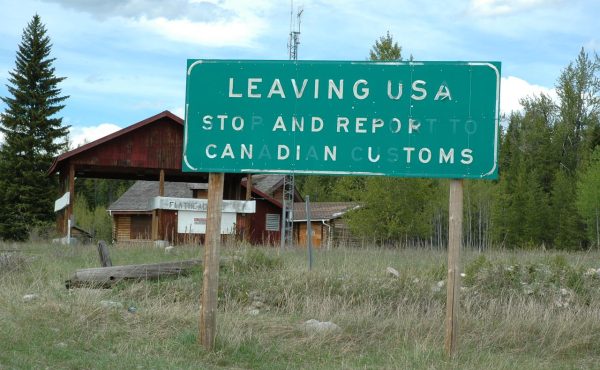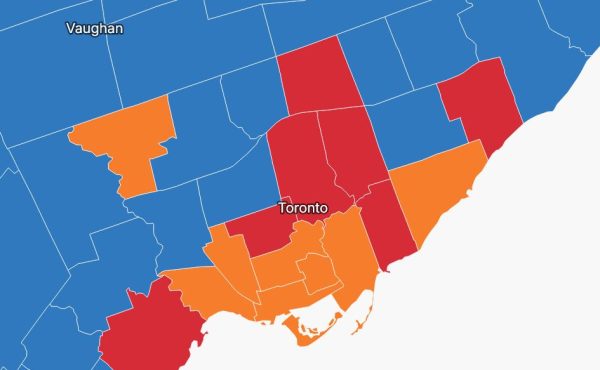

Anyone who’s followed Rob Ford’s political career know he’s got a quick trigger finger when it comes to hurling allegations of corruption at his council colleagues, the civil service and anyone else who fails to live up to his rhetoric of fiscal probity. But when accusations flow in the other direction, he has a history of responding with denials, prevarication or, in his current role, silence.
The politics of self-righteousness is always risky: as the old saying goes, those in live in glass houses shouldn’t throw stones, or footballs, as the case may be.
Case in point: over the past week, both the Toronto Star and The Globe and Mail published details about the relationship between Ford and the family business, Deco Labels and Tags. Drawn from various official documents, the revelations show:
• that the City and the TTC have done a moderate amount of business with Deco for several years;
• that the mayor has continued to spend time on Deco matters since assuming office;
• and that his election campaign spent $150,000 to purchase materials from Deco for his mayoral run, which cost $1.7 million according to filings submitted this week.
Let’s focus on what’s behind door number three, because those campaign expenses raise genuinely intriguing issues.
Almost 12% of the campaign’s total spending (i.e. the amount subject to the $1.3 million cap) found its way into Deco’s coffers, the firm founded by the late Doug Ford Sr. and which is said to have revenues of about $25 million.
The main question I have is whether the brothers Ford, who are among the company’s principal shareholders, pocketed the profits associated with those campaign purchases. The point seems germane because so many ordinary voters donated cash to a candidate focused obsessively on transparency and accountability.
The campaign funds spent on the Deco materials are anything but.
Did the candidate disclose to supporters that his family business would benefit financially from the campaign’s fundraising activities? And did the Fords, as Deco shareholders, benefit financially from an indirect subsidy because political contributions are eligible for a tax credit, with donors receiving a 75% refund.
The answers hinge on the terms of trade between Deco and the campaign. How did the two parties settle on a price for those goods? Needless to say, the Fords found themselves on both sides of the deal, raising issues of conflict of interest.
According to the city’s “campaign-expenses” election rules for calculating expenses, “In valuing campaign materials, the candidate should use the current market value.”
The current market value, of course, includes the profit margin, which flows back to the shareholders in the form of dividends. If the campaign followed the rules, those outlays could have yielded thousands of dollars in net earnings for Deco.
If, on the other hand, Deco offered Ford’s team the materials at cost, then the Respect for Taxpayer juggernaut may have violated City of Toronto election rules.
Either way, the mayor’s got some uncomfortable questions to address.
The list of unanswered Deco-related queries, incidentally, doesn’t end there. Important questions persist about the Bermuda triangle that has long existed between Ford’s political career, the family company and his office budget.
Ford always made a very public point of spending none of his office expense allocation. Yet city sources tell me that when Ford was a councillor, they were aware of the fact that Deco supplied goods for his office, but couldn’t resolve the issue of how these corporate contributions should be treated. He has always claimed he paid for those expenses from his own pocket.
But did he buy Deco-produced materials — e.g., business cards — at market value, or at a discount? If the customer is also the supplier, how did Ford decide on the price? And from Deco’s perspective, should discounted transactions be treated as in-kind political contributions and therefore subject to a tax break?
We don’t know the answers.
Lastly, when Ford was a councillor with little to do but trawl around other councillors’ wards in search of disgruntled residents, a City Hall source says he would often badger municipals officials to come directly to the homes of the people who phoned him so they could address those constituents’ problems in person.
Is this the most cost-efficient way for public servants to spend their time in a city with 2.5 million residents? Hardly, especially after the city invested millions on 311 — which, for reasons that look increasingly self-interested, he opposed.
Moreover, the marginal cost of those bureaucrats’ house calls never showed up on Ford’s office budget, although they certainly represented a draw on city resources.
In his Saturday column, The Globe’s Marcus Gee called on Ford to follow the lead of other political leaders and put his share of the company assets into a blind trust so Deco’s activities don’t continue to muddy the mayoral waters.
Certainly sound advice, but perhaps first the mayor of Toronto should consider refunding any profits he may have derived from the $150,000 in Deco-related campaign purchases. It may not be a huge sum, but that’s hardly the point.
Rob Ford has always harangued Torontonians about the principle that public and political expenditures, no matter how small, should be free from, well, gravy.
Well, from where I sit, I see gravy, and I think I know who the chef is.




12 comments
Not to worry, Deco Labels and Tags will be building the Sheppard Deco Subway for us, just like it pays for Councilor Ford’s income.
…or not.
The Fordian way to deal with this is obvious: the province should dissolve the city’s executive committee. It’s a principle of accountability.
(And replace them with George Smitherman for three months until a new executive can be reconstituted. Oh, and pay him $200,000 for his troubles.)
With less snark, it may not be a lot, but it still smells of graft. We should be able to expect our political leaders to come clean about their finances.
I dunno John.
One of the problems I have with the hunt for gravy is it’s very small potatoes we’re chasing, whoever is doing it. And any way I work the numbers, this is very small potatoes. It seems that if there’s anything here to find, it’s rather pathetically close to nothing, like someone raiding the take-a-penny tray.
Yes, the bros. Ford should probably step away from running a company that does business with the city. On the other hand, it’s not like the money is just disappearing into brown envelopes… we’re getting stickers out of it, and probably at a competitive price.
I like your work, but this whole article comes across as someone with a hammer, but not quite sure of what is or isn’t a nail.
Respectfully,
Richard.
Either way, the brothers Ford were dumb dumb dumb to use their own company — it just exposes them to unneeded scrutiny, but it shows just how dim-witted they can be (even though they hired the right folks to get them elected).
Simply put, they are in conflict of interest any way you look at it:
• If Deco gave them retail rates, then they personally profited from the campaign and election
• If Deco game them wholesale prices, then that break in price from Deco needs to be declared a donation which has a limit of $2500
Either way they spin it, they have put themselves in an unethical situation, no matter how small potatoes it seems.
If Rob Ford can take photos of muffins and juice at council meetings, then certainly journalists can question him and his campaign about potentially profiteering off of taxpayers. Talk about the chickens coming home to roost.
If you check or ask I think you will also find out that he is having all his stationary done through Deco as well like he did as a councillor
Ford might have been annoying in his manner when engaging people from other wards, but if those people were genuinely not getting service from their ward councillor what should they have done John? Who do these people appeal to?
Not to mention the borderline advertising on the mayor’s official bio page on the city’s website:
“As a principal of a successful family business, Deco Labels & Tags, employing over 200 people in North America, with plants in Etobicoke, Chicago and New Jersey…”
http://goo.gl/rjyMt
That’s a pretty big “IF” there Mark.
Richard > nice juxtaposition of gravy and potatoes.
Frankly, there are a lot more substantive matters that progressives could be focusing on than a few small contracts going to Deco. The “call me anytime” mayor makes media appearances so short that they are measured in minutes and seconds, while the unelected but de facto mayor appears to be his brother. The Taxpayer-Respecter saves pennies in gravy on things like councillors’ salaries and expense budgets while proposing to build a white-elephant multi-billion-dollar subway through a funding plan that has no foundation in reality. Mr. Transparency steers a 2011 budget process that completely ignores a $700M hole in the 2012 budget. Mr. Accountability fires the board of TCHC, including board members that were appointed in the fall and clearly had nothing to do with any dispersal of gravy and/or chocolates. Let’s not lose focus on the big picture, folks.
I can’t believe the amount of ink and newsprint that’s been devoted to the Deco contracts with the City, when the amount is miniscule relative to the budgets of each, and when it appears on the face of it that things were above board.
@Mark — For many people, the problem with City Hall is that it can be really difficult to navigate through the system, even if solutions are available. Some people may have unresponsive councillors. Some may have problems that are not resolvable. The city has a 311 service, now, and it also has lots of ways to contact different departments. Yes, Ford attended to all these homeowners, partly because so few residents live in his ward and he had time on his hands. But what no one knows is whether those people exhausted all their avenues before turning to Ford, or whether they called him because he promoted this “service.”
I’m not sure the Fords did it intentionally – more likely the company is so ingrained in their lives, and has been since before Rob and probably Doug were born, that they have a hard time separating the company from their lives.
However, it does raise important questions, and they are questions that reporters should be asking.
What scares me is that Ford/whoever’s in control seem to be actively trying to block people from asking questions. Hence shutting out the Star, hence the attempts at blocking reporters, hence the one-man TCHC board that is firmly in their pockets (although the Pinko side managed to block Ootes from being completely unaccountable, which was likely an unanticipated setback). The active belittlement of opponents, and the media manipulation.
What really worries me is that Mayor Rob Ford is a completely different man than Councillor Rob Ford was. Coun. Ford was loud, quick tempered, never afraid to share his opinion yet still very charismatic. Mayor Ford is quiet, sullen, and constantly hides behind spokespeople, most notably his brother. I don’t think Councillor Ford circa 2007 would necessarily have been that bad a mayor – Mel Lastman II, perhaps a bit of a clown and generally ineffective, but not what we’re getting today.
I have to wonder how much Nick Kouvalis is still behind the scenes. After a campaign based on intimidation and obnoxious online politics (ie Queens Quay Karen) there is still a lot of that going on. Why did Gunns change his mind about helping the TTC? Why are left-leaning blogs and newspapers constantly spammed with pro-Ford commentators who all keep repeating the same propoganda over and over again? There are times when you can watch the Pro-Ford comments roll in in real time on the G&M website – and they all promptly get 40 “thumbsups” within a few minutes.
The strategy of constant Freedom-of-Information requests is probably a good one. Finding something is not a matter of if, but when.
Wow. That has got to be the weakest attack I’ve ever heard. I’m no fan of RF, but this really lame.